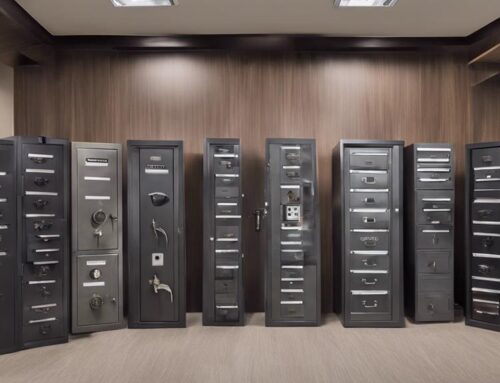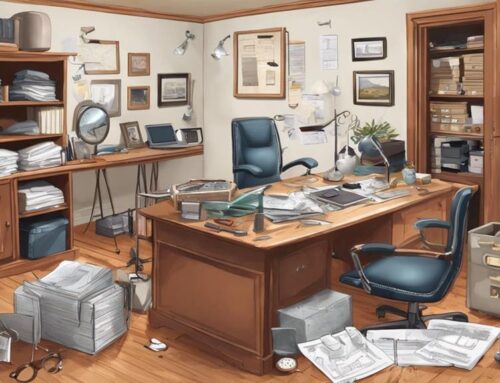Do you ever feel like you’re sailing through life without an anchor?
It’s time to secure your path and protect what matters most.
In this article, we’ll explore the top ten things everyone forgets to secure.
From important documents to personal vehicles, we’ll guide you on how to safeguard your valuables.
Don’t let freedom slip through your fingers.
Take control and secure your world today.
Important Documents
Don’t forget to keep your important documents, such as birth certificates and passports, securely stored to prevent loss or theft.
Securing sensitive information is crucial to safeguarding your identity and personal freedom. Implementing document protection measures can help ensure that your important papers remain safe and accessible when needed.
Consider storing these documents in a fireproof and waterproof safe, or in a secure location such as a safety deposit box. Additionally, make digital copies of your important documents and store them on a secure backup hard drive or in a password-protected cloud storage service.
Remember to regularly update and review your document protection measures to adapt to changing circumstances and maintain the security of your sensitive information.
Backup Hard Drives
Make sure you regularly back up your important data on a secure hard drive to prevent data loss.
Backup hard drives are essential for safeguarding your valuable information from computer damage or viruses. They provide mobile data storage and can be encrypted for added security.
It’s crucial to store the physical drive in a safe location and consider utilizing off-site storage options like safety deposit boxes.
Data encryption ensures that your data remains secure and protected from unauthorized access.
By backing up your data on a secure hard drive, you can have peace of mind knowing that your information is safe and easily accessible when needed.
Guns and Ammunition
Ensure that you properly secure your firearms and ammunition to prevent unauthorized access and prioritize the safety of yourself and others.
Responsible gun ownership includes taking necessary precautions to ensure gun safety. Store your guns and ammunition in a locked cabinet or safe when not in use. Only allow authorized and trained individuals to access them.
By securely storing your firearms, you reduce the risk of accidents or unauthorized use. Remember to keep the keys or combination to your gun safe in a separate and secure location. Additionally, consider utilizing gun locks or cable locks for an extra layer of security.
Responsible gun ownership means taking the necessary steps to protect yourself, your loved ones, and your community. Prioritize gun safety to enjoy the freedom that responsible gun ownership brings.
Medication
Remember to always secure your medication to prevent unintended consequences and potential harm.
Securing medication is of utmost importance, especially when it comes to keeping it safe from children.
Sharing prescription medication with others should be avoided, as it can lead to serious health risks.
Medicine cabinets may not provide the most secure solution, so it is recommended to use lockboxes for non-urgent medication.
For life-saving medication, consider using a child latch lock medicine cabinet to ensure it is inaccessible to children.
Additionally, storing medication in a safe or locked drawer can provide an extra layer of security.
Jewelry, Heirlooms, and Collectables
Protect your valuable jewelry, heirlooms, and collectables by properly securing them and avoiding leaving them unattended or unsecured. Securing valuable items is crucial to ensure their safety and prevent theft or damage.
When displaying and storing collectables, it is important to take precautions to protect them. Utilize lockboxes or safes to securely store valuable jewelry and high sentimental value items. Avoid making it a habit to leave valuables unsecured, as burglars spend a short amount of time in a home. Take the necessary steps to protect your valuable items during this timeframe.
Personal Electronics
Keep your personal electronics secured when not in use to prevent unauthorized access and potential theft. Data protection and mobile device security are crucial in today’s digital age.
Set up passcodes or biometric locks on your smartphones, tablets, and laptops for added security. Avoid leaving your personal electronics unattended in public places, as they can be easily stolen.
Utilize tracking apps or software to locate lost or stolen devices. Encrypt sensitive data stored on your personal electronics to protect it from prying eyes.
Remember to regularly update your devices’ firmware for security patches. By taking these precautions, you can ensure the safety of your personal information and prevent unauthorized access to your data.
Home Wi-Fi Network
Now that you’ve taken steps to secure your personal electronics, let’s turn our attention to your home Wi-Fi network.
Securing your Wi-Fi network is essential to protect your privacy and prevent unauthorized access. Start by securing your Wi-Fi password. Choose a strong password that includes a combination of letters, numbers, and special characters. Avoid using common or easily guessable passwords.
Additionally, enable network encryption, specifically WPA2, which ensures secure data transmission over your network. Changing the default login credentials for your router is another important step in securing your Wi-Fi network. This prevents potential attackers from easily accessing and compromising your network.
Lastly, regularly update your router’s firmware to ensure you have the latest security patches. By following these steps, you can enjoy the freedom of a secure and protected Wi-Fi network.
Online Accounts
Remember to regularly update your passwords and security questions to ensure the protection of your online accounts.
Password security is crucial in today’s digital world, where cyber threats are rampant. By using strong, unique passwords for each online account, you can significantly reduce the risk of unauthorized access.
Additionally, enable two-factor authentication for added security, which requires a second form of verification to log in.
Stay vigilant and be cautious of phishing attempts and suspicious emails. Phishing awareness is essential to prevent falling victim to scams that aim to steal your personal information.
Be mindful of the websites you visit and the links you click on.
Social Media Profiles
Make sure to review and adjust your privacy settings on your social media profiles to control who can see your posts. It is crucial to protect your personal information from falling into the wrong hands. Here are some key steps to take:
- Be mindful of the personal information you share on social media. Avoid posting sensitive details like your full name, address, phone number, or financial information.
- Regularly monitor your social media accounts for suspicious activity. If you notice any unauthorized access or suspicious behavior, take immediate action to secure your account.
- Think twice before posting location-based information. Sharing your exact whereabouts can potentially compromise your safety and privacy.
Personal Vehicles
When leaving your personal vehicle unattended, remember to lock it and keep the windows closed to prevent unauthorized access. Securing your vehicle is essential to protect your freedom and belongings.
To further enhance the security of your vehicle, consider installing a car alarm system. Car alarms act as a deterrent, alerting you and others nearby of any attempted break-ins.
Additionally, make sure to keep your vehicle registration and insurance documents secure. This will help prevent identity theft and unauthorized use of your vehicle.
Frequently Asked Questions
How Can I Protect My Important Documents From Fire or Water Damage?
To protect your important documents from fire or water damage, consider both digital and physical security measures. Safeguard digital files by using cloud storage and backing up regularly. For physical copies, store them in fireproof and waterproof containers or safes.
If you suspect unauthorized access to your online accounts, take immediate action. Change passwords, enable two-factor authentication, and review account activity. Regularly update passwords, be cautious of phishing attempts, and use a password manager for added security.
Are There Any Specific Security Measures I Should Take When Traveling With Valuable Jewelry or Collectables?
When traveling with valuable jewelry or collectables, it’s crucial to secure them properly. Use a discreet, secure travel case or bag with locks. Consider using a hotel safe or keeping items with you at all times.
How Can I Ensure the Security of My Personal Electronic Devices in Case of Theft or Loss?
To secure your personal electronic devices on public transportation or in crowded areas, keep them physically close to you at all times. Use a passcode or biometric lock, enable tracking apps, and encrypt sensitive data for added security.
What Steps Should I Take if My Wi-Fi Network Has Been Hacked or Compromised?
To prevent unauthorized access to your Wi-Fi network and strengthen its security, take these steps: change default login credentials, use a strong password and network encryption, disable remote administration, and update router firmware regularly.


